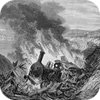
| Abergele Train Disaster
The Abergele Train Disaster in 1868 was, up to that time, the worst railway disaster in Britain.
On August 20, 1868, at 7.30 a.m., the Irish Mail train left the Euston Station in London for Holyhead. It pulled four passenger carriages, a mail van and a traveling post office. At 11.30 a.m. in Chester, it collected four additional passenger carriages that were attached immediately behind the locomotive. After an hour the train was approaching Abergele in Wales.
At the same time at Llandulas, railway workers shunted cargo trucks from the main line to the sidings. During the shuffling, they had to leave six trucks with a brake van on the main line. Two of the trucks carried barrels of paraffin. When some of the trucks were shunted against them, the brakes in a brake van slipped, and the trucks begun to slide down the incline toward the Irish Mail.
Engine driver Arthur Thompson saw the trucks speeding towards the train from behind the curve of the sea wall. He turned off steam and threw the engine into reverse, but it was too late. He jumped just before the inevitable collision, suffering serious injuries.
When the cargo trucks collided with the engine, the paraffin exploded, and fire engulfed the locomotive and the first four carriages, killing 32 passengers and the fireman in a matter of seconds.
A number of labourers ran to the scene from a nearby quarry and formed a human chain, trying to quench the flames with seawater; however, they failed to save anyone. (The bodies were so scarred that only three of them could be later identified.) The victims were buried in a huge trench, with the London & North Western Railway Company paying all funeral expenses.
During the inquest, the coroner received an anonymous letter that put the blame on the Fenians; the Irish rebels had supposedly tried to assassinate the wife and servants of the Lord Lieutenant of Ireland. The inquest did not find any kind of evidence to support this, and the letter was declared a hoax.
Injured Arthur Thompson was unfairly suspected of speeding but there was much sympathy for him; he died of his injuries in October. Llandulas' brakemen assured that they were very careful, although some witnesses claimed they had seen runaway trucks before. The brakemen were not prosecuted, but were criticised by the Board of Trade Inspector, Colonel Rich, for shunting on the main line too soon before the express was due. He also criticised the railway company for an inadequate siding layout.
Newspapers blamed the railway company for not ensuring the safety of the passengers. The Board of Trade demanded a number of safety measures, including a telegraph system to connect all the stations, and that inflammable material should be transported on special trains.
After the Abergele disaster It became the practice for steep inclines to be fitted with runaway catchpoints so that runaway vehicles would be derailed and stopped before they had a chance to collide with following trains.
These catchpoints became widespread, and only diminished in numbers when all rolling stock was fitted with continuous automatic brakes in the 1980s.
|
